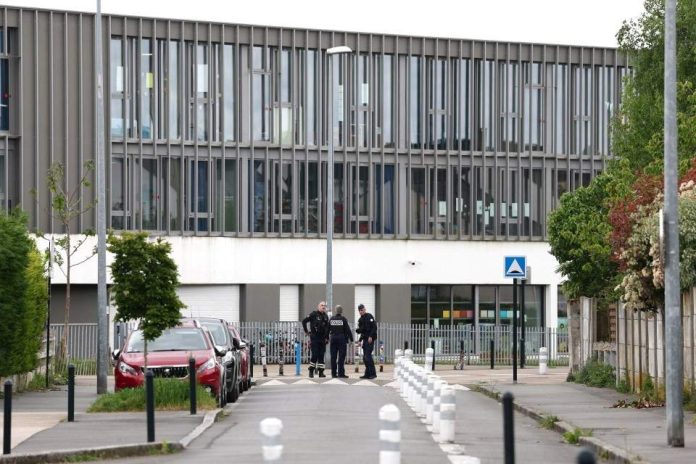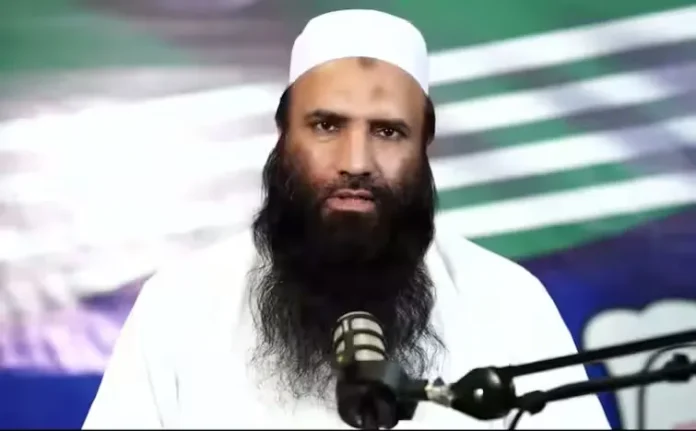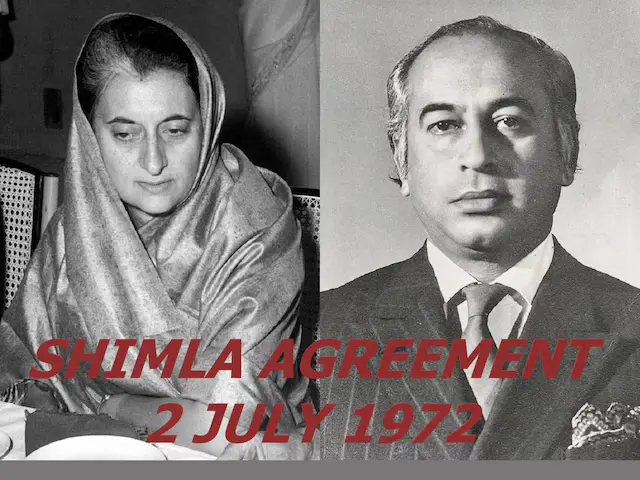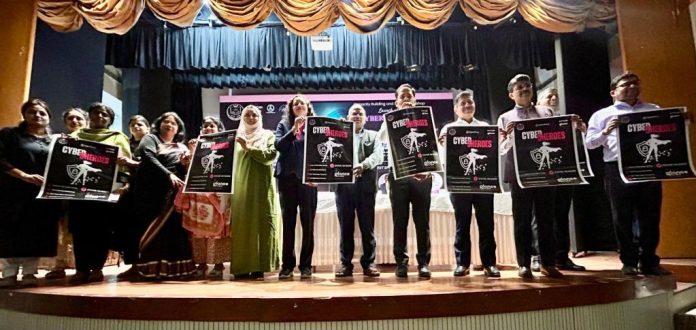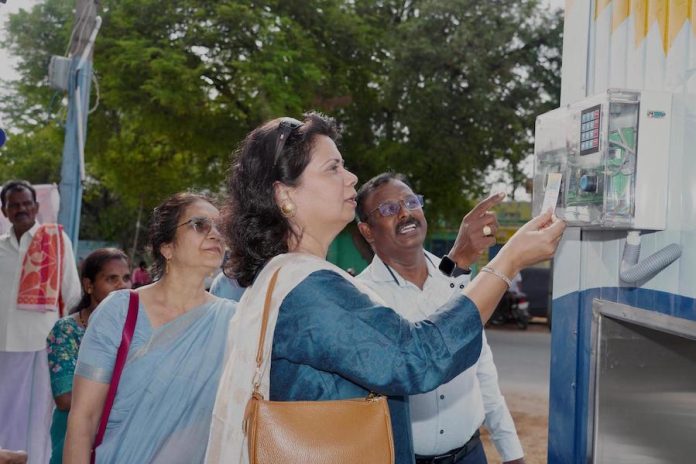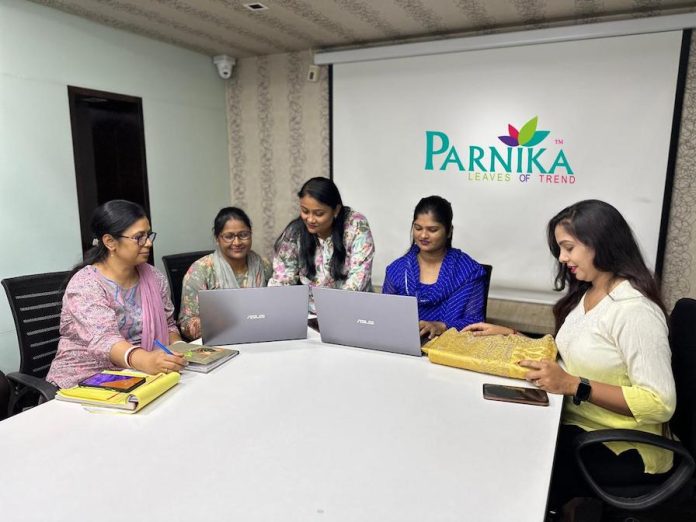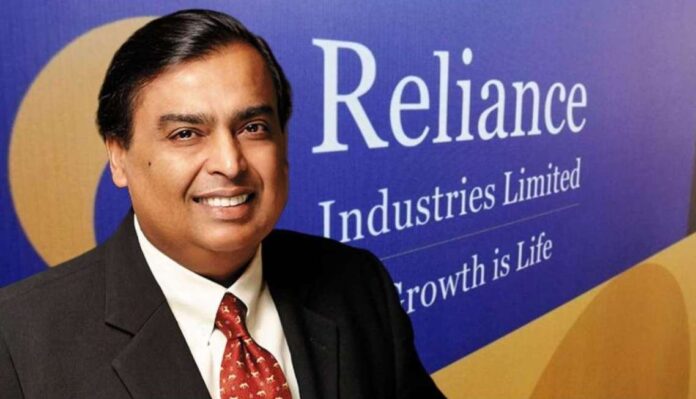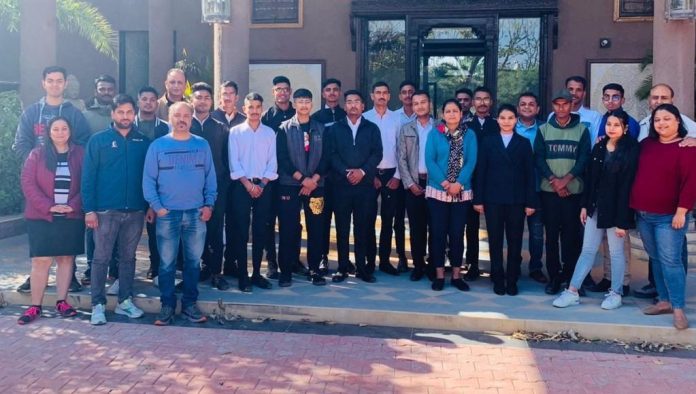Who is Saifullah Khalid — the alleged mastermind behind the Pahalgam Terror Attack?
In a horrifying terror attack that shook Kashmir’s picturesque Baisaran meadow in Pahalgam, Pakistan-based terrorists opened fire on a group of tourists on Tuesday, killing at 26 people and injuring 17 including tourists and security personnel. Two officers from Indian Navy and the Intelligence Bureau were also among the deceased.
The Resistance Front (TRF), a terror outfit, has reportedly claimed responsibility for the massacre in Pahalgam. The organisation is backed by Pakistan’s intelligence agency ISI. The Resistance Front is allegedly linked to the banned Lashkar-e-Taiba (LeT). The outfit is considered a proxy of LeT founder and 26/11 mastermind Hafiz Saeed.
“More than 85,000 domiciles have been issued to non-locals, creating a pathway for demographic change in Indian-occupied Jammu & Kashmir (IIOJK). These non-locals arrive posing as tourists, obtain domiciles, and then begin to act as if they own the land. Consequently, violence will be directed toward those attempting to settle illegally,” TRF said.
LeT’s top Commander Saifullah Kasuri, alias Khalid, is suspected to be one of the plotters, according to an intelligence assessment. The role of two Rawalkot-based Lashkar commanders, one of whom is Abu Musa, is also being checked.
Who is Saifullah Khalid?
Saifullah Kasuri aka Khalid was designated for acting on behalf of LeT. Khalid was introduced as the President of the MML and spoke about the party’s formation, aims, and objectives, during an August 8, 2017 press conference, according to the US Treasury.
Khalid is also the head of LeT’s Peshawar headquarters, and served on Jamaat-ud Dawa (JuD)’s Coordination Committee for Central Punjab Province. JuD was designated by the Department of State as an alias of LeT pursuant to E.O. 13224 in April 2016, and was added to the United Nations 1267/1988 Sanctions list as an alias of LeT in December 2008.
TRF a terrorist organisation: Government of India
According to the Ministry of Home Affairs, TRF “has been involved in the planning of killings of security force personnel and innocent civilians of Jammu and Kashmir, co-ordinating and transporting weapons to support proscribed terrorist organisations, recruitment of terrorists, infiltration of terrorists and smuggling of weapons and narcotics from across the border.”
The Government of India formally designated TRF as a terrorist organisation under the UAPA in the year 2023. This move allowed for stronger surveillance and crackdowns on its operations and associates. Furthermore the National Investigation Agency (NIA) and other central agencies have intensified their efforts to dismantle the group’s operational infrastructure.
Kashmir valley shutdown in protest against Pahalgam attack
Meanwhile, Kashmir valley observed a shutdown against the Pahalgam attack on Wednesday as organisations from all walks of life supported the bandh call to protest the killings in the Pahalgam tourist resort.
Several political parties, socio-religious organisations, trade bodies, and civil society groups called for a shutdown in Kashmir to protest the attack in Baisaran meadows of the Pahalgam resort in south Kashmir’s Anantnag district. The ruling National Conference (NC), Peoples Democratic Party (PDP), Peoples’ Conference, and Apni Party were among the political outfits that supported the shutdown.
Security has been beefed up across the valley, especially at vital tourist spots. The officials said that most of the shops, fuel stations, and other business establishments were shut down in Srinagar.
Pahalgam Attack: पाकिस्तान ने तोड़ा शिमला समझौता
Pahalgam Attack: भारत के सिंधु जल संधि Indus Water Treaty रद्द करने के बदले पाकिस्तान ने शिमला समझौते से कदम वापस खींच लिए हैं। Shimla Agreement 1972: 1971 के भारत-पाकिस्तान युद्ध के बाद 02 जुलाई 1972 के दिन हिमाचल प्रदेश के शिमला में इंदिरा गांधी और जुल्फिकार अली भुट्टो के बीच शिमला समझौते पर हस्ताक्षर किए गए थे। पाकिस्तान ने गुरुवार को भारत से जुड़े 1972 के शिमला समझौते को सस्पेंड कर दिया है। इसके साथ ही वाघा बॉर्डर बंद कर दिया गया है, भारत से आने-जाने वाली हर तरह की आवाजाही रोक दी गई है और भारतीय विमानों के लिए हवाई क्षेत्र भी बंद कर दिया गया है। ये सब फैसले तब लिए गए हैं जब भारत ने जम्मू-कश्मीर के पहलगाम में हुए आतंकी हमले के बाद पाकिस्तान के खिलाफ सख्त कदम उठाए—जिसमें सबसे बड़ा फैसला था Indus Water Treaty को सस्पेंड करना।
Pahalgam Attack: पहलगाम में इस्लामी आतं
भारत ने रोका सिंधु जल समझौता
Pahalgam Attack: सुरक्षा मामलों की मंत्रिमंडलीय समिति की बैठक (CCS Meeting) में फैसला लिया गया कि पाकिस्तान के साथ 1960 में हुई Indus Water Treaty को सस्पेंड किया जाए। भारत के इस कदम से पाकिस्तान में खलबली मची हुई है। जवाबी एक्शन में पाकिस्तान ने अपना Airspace भारतीय विमानों के लिए बंद कर दिया, वाघा बॉर्डर को आवाजाही के लिए बंद कर दिया और अब शिमला समझौता भी निरस्त कर दिया है। क्या शिमला समझौता तोड़ने से पाकिस्तान को फायदा होगा और भारत को नुकसान?
क्या है Shimla Agreement
Shimla Agreement 1972: 1971 के भारत-पाक युद्ध के बाद भारत के शिमला में एक सन्धि पर हस्ताक्षर हुए। इसे शिमला समझौता कहते हैं। इसमें भारत की तरफ से इंदिरा गांधी और पाकिस्तान की तरफ से ज़ुल्फ़िकार अली भुट्टो शामिल थे। यह समझौता भारत और पाकिस्तान के बीच दिसम्बर 1971 में हुई लड़ाई के बाद किया गया था, जिसमें पाकिस्तान के 90,000 से अधिक सैनिकों ने अपने लेफ्टिनेंट जनरल नियाजी के नेतृत्व में भारतीय सेना के सामने आत्मसमर्पण किया था और तत्कालीन पूर्वी पाकिस्तान को बांग्लादेश के रूप में पाकिस्तानी शासन से मुक्ति प्राप्त हुई थी। यह समझौता करने के लिए पाकिस्तान के तत्कालीन प्रधानमन्त्री जुल्फ़िकार अली भुट्टो अपनी पुत्री बेनजीर भुट्टो के साथ 28 जून 1972 को शिमला पधारे। ये वही भुट्टो थे, जिन्होंने घास की रोटी खाकर भी भारत से हजारो वर्ष तक युद्ध करने की कसमें खायी थीं। 28 जून से 1 जुलाई तक दोनों पक्षों में कई दौर की वार्ता हुई, परन्तु किसी समझौते पर नहीं पहुंच सके। इसके लिए पाकिस्तान की हठधर्मी ही मुख्य रूप से जिम्मेदार थी। तभी अचानक 2 जुलाई को लंच से पहले ही दोनों पक्षों में समझौता हो गया, जबकि भुट्टो को उसी दिन वापस जाना था। इस समझौते पर पाकिस्तान की ओर से भुट्टो और भारत की ओर से इन्दिरा गांधी ने हस्ताक्षर किये थे। यह समझना कठिन नहीं है कि यह समझौता करने के लिए भारत के ऊपर किसी बड़ी विदेशी ताकत का दबाव था। अपना सब कुछ लेकर पाकिस्तान ने एक खोखला सा आश्वासन भारत को दिया कि भारत और पाकिस्तान के बीच कश्मीर सहित जितने भी विवाद हैं, उनका समाधान आपसी बातचीत से ही किया जाएगा और उन्हें अन्तरराष्ट्रीय मंचों पर नहीं उठाया जाएगा। लेकिन इस इकलौते आश्वासन का भी पाकिस्तान ने सैकड़ों बार उल्लंघन किया है और कश्मीर विवाद को पूरी निर्लज्जता के साथ अनेक बार अन्तरराष्ट्रीय मंचों पर उठाया है। वास्तव में उसके लिए किसी समझौते का मूल्य उतना भी नहीं है, जितना उस कागज का मूल्य है, जिस पर वह समझौता लिखा गया है। इस समझौते में भारत और पाकिस्तान के बीच यह भी तय हुआ था कि 17 दिसम्बर 1971, अर्थात पाकिस्तानी सेनाओं के आत्मसमर्पण के बाद दोनों देशों की सेनाएं जिस स्थिति में थीं, उस रेखा को ”वास्तविक नियन्त्रण रेखा“ माना जाएगा और कोई भी पक्ष अपनी ओर से इस रेखा को बदलने या उसका उल्लंघन करने की कोशिश नहीं करेगा। लेकिन पाकिस्तान अपने इस वचन पर भी टिका नहीं रहा। सब जानते हैं कि 1999 में कारगिल में पाकिस्तानी सेना ने जानबूझकर घुसपैठ की और इस कारण भारत को कारगिल में युद्ध लड़ना पड़ा।
कब हुआ था शिमला समझौता
Shimla Agreement 1972: भारत और पाकिस्तान के बीच शिमला समझौता 2 जुलाई, 1972 को हुआ था। इस पर दोनों देशों के प्रधानमंत्रियों, क्रमशः इंदिरा गांधी और जुल्फिकार अली भुट्टो ने हस्ताक्षर किए थे। यह सिंधु जल समझौते के 12वें साल हुआ। सिंधु जल संधि 19 सितंबर, 1960 को विश्व बैंक (World Bank) की मध्यस्थता में भारत और पाकिस्तान ने साइन किया था। सिंधु जल समझौता पाकिस्तान के कराची में तो शिमला समझौता भारत के हिमाचल प्रदेश की राजधानी शिमला में हुआ था।
शिमला समझौते में क्या-क्या है
Shimla Agreement 1972: भारत और पाकिस्तान की सरकारों ने आपसी संबंधों को बेहतर बनाने के लिए शिमला समझौता किया। इसका उद्देश्य दोनों देशों के बीच शांति स्थापित करना और लोगों के कल्याण के लिए काम करना है। इस समझौते के मुख्य बिंदु इस प्रकार हैं…
इस समझौते में बनी आपसी सहमति के तहत भारत और पाकिस्तान ने तय किया कि उनके बीच कोई भी झगड़ा, जैसे कश्मीर का मसला, आपस में बातचीत से सुलझाया जाएगा। इसमें कोई तीसरा देश, जैसे अमेरिका या संयुक्त राष्ट्र, दखल नहीं देगा।
नियंत्रण रेखा (LoC) का सम्मान
कश्मीर में भारत और पाकिस्तान के बीच एक लाइन है, जिसे नियंत्रण रेखा कहते हैं। दोनों देशों ने वादा किया कि इस लाइन को कोई एकतरफा नहीं बदलेगा और इसका सम्मान करेंगे।
शांति बनाए रखना
दोनों देशों ने कहा कि वे एक-दूसरे के खिलाफ हिंसा, युद्ध या गलत प्रचार नहीं करेंगे। दोनों शांति से रहेंगे और अपने रिश्ते बेहतर करेंगे।
बंदियों की रिहाई और जमीन वापसी
भारत ने पाकिस्तान के 90,000 सैनिकों को छोड़ा और युद्ध में कब्जाई जमीन वापस की। बदले में उस समय पाकिस्तान ने भी भारत के कुछ सैनिकों को रिहा किया था।
क्यों खास है ये समझौता
Shimla Agreement 1972: इस समझौते ने कश्मीर को द्विपक्षीय मसला बनाया और कश्मीर के मुद्दे को अंतरराष्ट्रीय मंचों, जैसे संयुक्त राष्ट्र, पर ले जाने से रोका। भारत हमेशा कहता है कि कश्मीर भारत और पाकिस्तान का आपसी मामला है। समझौते ने तत्काल सैन्य तनाव को कम करने और दक्षिण एशिया में स्थिरता को बढ़ावा देने में योगदान दिया। युद्धविराम व्यवस्था और नियंत्रण रेखा की स्थापना ने अनियोजित सैन्य वृद्धि को रोका। 1971 के युद्ध और शिमला समझौते ने भारत को एक क्षेत्रीय शक्ति के रूप में स्थापित किया। इंदिरा गांधी की दृढ़ नेतृत्व ने भारत को वैश्विक मंच पर एक गंभीर खिलाड़ी के रूप में उभारा। पाकिस्तान ने अपने युद्धबंदियों और क्षेत्रों की वापसी हासिल की, लेकिन वह कश्मीर को अंतरराष्ट्रीय मुद्दा बनाने में असफल रहा। इसके अलावा, समझौते के प्रावधानों का बार-बार उल्लंघन, जैसे नियंत्रण रेखा पर संघर्ष और आतंकवाद को प्रायोजित करना, ने इसकी विश्वसनीयता को कमजोर किया।
तो भारत को ही होगा फायदा
Shimla Agreement 1972: कश्मीर पर अंतरराष्ट्रीय दबाव से मुक्ति: शिमला समझौता कश्मीर को द्विपक्षीय मुद्दा बनाए रखने का आधार है। यदि पाकिस्तान इसे रद्द करता है, तो भारत यह तर्क दे सकता है कि पाकिस्तान ने स्वयं समझौते को अमान्य कर दिया, जिससे भारत को कश्मीर पर अपनी नीतियों को और मजबूत करने की स्वतंत्रता मिलेगी। भारत यह दावा कर सकता है कि कश्मीर उसका आंतरिक मामला है, और वह बिना किसी बाहरी दबाव के इस पर निर्णय ले सकता है।
कूटनीतिक अलगाव: समझौता रद्द करना पाकिस्तान की कूटनीतिक विश्वसनीयता को और कमजोर करेगा। वैश्विक समुदाय इसे एक गैर-जिम्मेदार कदम के रूप में देखेगा, जिससे पाकिस्तान का अंतरराष्ट्रीय अलगाव बढ़ सकता है। भारत इस स्थिति का लाभ उठाकर पाकिस्तान को आतंकवाद के प्रायोजक के रूप में और उजागर कर सकता है।
सैन्य और रणनीतिक स्वतंत्रता: शिमला समझौते ने नियंत्रण रेखा को एक स्थायी सीमा के रूप में मान्यता दी। यदि यह रद्द होता है, तो भारत इसे एक अवसर के रूप में देख सकता है और नियंत्रण रेखा के पार, विशेष रूप से पाकिस्तान के कब्जे वाले कश्मीर (PoK) में, अधिक आक्रामक रणनीति अपना सकता है। भारत PoK में विकास परियोजनाओं को बढ़ावा दे सकता है या वहां के लोगों के साथ सीधा संपर्क स्थापित कर सकता है।
चीन के साथ संबंधों पर प्रभाव: शिमला समझौता रद्द होने से भारत को चीन-पाकिस्तान आर्थिक गलियारे (CPEC) जैसे प्रोजेक्ट्स पर और सवाल उठाने का मौका मिलेगा, क्योंकि ये PoK से होकर गुजरते हैं। भारत इसे अपनी क्षेत्रीय अखंडता के खिलाफ एक कदम के रूप में प्रस्तुत कर सकता है।
CSR News: Initiative to Provide Clean Water through 20 iJal Stations in Karnataka
Bayer, a global enterprise with core competencies in healthcare and agriculture, in partnership with Safe Water Network India, has launched an initiative to provide communities in Karnataka with access to safe affordable drinking water through 20 iJal stations in and around Chikkaballapur. The launch, which will take place in Bengaluru, is part of a nationwide initiative involving installation of 90 iJal water stations in Karnataka, Maharashtra, Gujarat and Telangana. These iJal stations will help nearly 3 lakh people in these states get inclusive and equitable access to clean water.
Due to depleting groundwater reserves, erratic rainfall, and poor civic infrastructure, access to clean and safe drinking water is on a sharp decline, especially in India. The country has 18 percent of the world’s population, but only 4 percent of its water resources, making it among the most water-stressed in the world. Installation of water ATMs in the form of iJal stations can help safeguard supply of clean water to vulnerable communities. More than just clean water, this initiative empowers local communities by involving Self-Help Groups and entrepreneurs, creating livelihood opportunities and enhancing the project’s sustainability. Designed for long-term impact, the iJal initiative is built for scalability, ensuring that more communities can benefit from reliable access to clean water in the future.
Speaking at the launch of the iJal stations in Bangalore, Rachana Panda, VP & Cluster Comms Head, Bayer ASEAN, ANZ & South Asia, and Director – Bayer Foundation India, said, “Access to clean drinking water is not just a necessity—it’s a right. With the launch of iJal stations in Bangalore, we are enabling underserved communities to take charge of their water security. This model goes beyond just access to clean water—it builds local ownership, helps improve the community’s health, reduces the daily drudgery of fetching water leaving women with more time for productive work, increases economic opportunities and lays the groundwork for a viable, community-led change.”
The installation of iJal stations is currently being facilitated across Karnataka, Maharashtra, Gujarat, and Telangana, with 34 sites confirmed and 56 additional locations under development across the country. These stations, managed by local Self-Help Groups (SHGs) and entrepreneurs, provide affordable clean water to communities through an easy-to-use prepaid RFID card system, ensuring reliable access to clean water for all. Bengaluru currently faces a daily water shortage of nearly 500 million liters, while in Chikkaballapur, groundwater overuse has reached 145% of sustainable levels. Many villages now rely on water tankers, highlighting the urgent need for accessible and reliable drinking water solutions. These challenges not only affect daily life but also increase health risks, especially in rural and peri-urban areas. The iJal stations aim to ease this burden by bringing clean water closer to where people live.
“Bayer’s iJal initiative is a commendable step toward ensuring access to clean drinking water for citizens of Chikkaballapur. Such initiatives from the private sector play a crucial role in supporting the government’s efforts of providing access to critical basic amenities to the citizens of the state in a sustainable manner. The government is committed to supporting such initiatives and welcomes the efforts of private sector players like Bayer in supporting local communities,” said Shri S N Subbareddy, MLA, Chikkaballapur, Karnataka.
The iJal project will also help transform communities as the initiative includes comprehensive training programs to empower locals with the skills to effectively operate and maintain the iJal water stations. In addition, smart cards for accessing water and community engagement drives will raise awareness about the importance of safe water, promoting responsible usage across all households.
A dedicated maintenance network will ensure the continuous functionality of the stations, with trained technicians available to address any issues promptly. The project’s success will be monitored through an uptime-focused Monitoring and Evaluation (M&E) framework, which will track station performance and reduce downtime.
Speaking at the launch of the iJal stations, Ravindra Sewak, India Country Director, Safe Water Network said, “The uniqueness of this water station lies in the fact that it will be run and maintained by self-help groups from within the community. Use of technology and a small charge on the service will ensure long term viability of the water dispensing station and also efficient and need based utilisation of a precious resource like water. We are happy to partner with Bayer in setting up 89 more such stations across the country. Bayer and Safe Water Network’s commitment to water stewardship and understanding of the critical need for clean drinking water make for an ideal partner in driving this important cause forward.”
This effort is a part of Bayer’s broader focus on supporting meaningful, community-driven change. By responding to essential needs like clean water, the initiative hopes to contribute to better health and well-being in a way that’s practical, inclusive, and sustainable. The start of the iJal stations marks the beginning of a committed journey toward sustainability—where communities don’t just survive, they thrive.
Disclaimer: This media release is auto-generated. The CSR Journal is not responsible for the content.
CSR News: Initiative empowers 10,000+ Women Entrepreneurs through its Women’s Support Program
Parnika India, a distinguished leader in the manufacturing & global export of exquisite women’s ethnic wear based out of Surat and a strong proponent of inclusive entrepreneurship, has further strengthened its social impact initiative through its Women Support Program, a dedicated effort to empower women entrepreneurs, especially those looking to build businesses from home. The initiative has already enabled over 10,000 women across India to begin their entrepreneurial journeys with minimal investment and maximum support.
Launched with the core mission of making women self-reliant and confident in their business pursuits, the Women Support Program offers comprehensive training in areas such as business development, time management, social media marketing, and digital customer engagement. These modules are specially curated to help homemakers, working mothers, and aspiring entrepreneurs operate flexible, home-based ventures with ease and confidence.
“As manufacturers, we have a unique opportunity to extend wholesale pricing and low-investment business models to women who wish to start from scratch. Our model ensures healthy profit margins even with minimal capital, allowing women to start lean but scale effectively. We’ve seen homemakers evolve into confident business owners with steady monthly incomes; their stories are a testament to what’s possible when intent meets the right opportunity,” said Vishal Pacheriwal, Managing Director of Parnika India.
To further assist these entrepreneurs, Parnika India provides a robust set of marketing tools, including professionally designed digital creatives, ready-to-use product catalogs, WhatsApp message templates, and content for social media promotions. These resources simplify the go-to-market process, making it easier for women to focus on selling and building customer relationships.
The measurable impacts of the program have been notable: improved digital literacy, greater financial independence, and increased social influence. Many participants have gone on to become local role models, encouraging other women in their communities to pursue entrepreneurship.
Looking ahead, Parnika India plans to expand the reach of the Women Support Program to empower over 100,000 women entrepreneurs by 2030. The initiative aligns with the company’s broader mission to make entrepreneurship accessible regardless of location, background, or financial resources.
Disclaimer: This media release is auto-generated. The CSR Journal is not responsible for the content.
Tata Memorial Centre Launches MenCan Initiative to Address Men’s Cancers
Tata Memorial Centre (TMC) proudly unveils MenCan, an innovative initiative by the Urologic Oncology Disease Management Group (URO DMG) focused on improving the lives of men affected by prostate, penile, and testicular cancers.
Rising Incidence of Men’s Cancers in India
According to the latest data from the Global Cancer Observatory (GCO) 2022, the incidence of prostate cancer is on the rise in India, with an expected 12.6 new cases per 100,000 people, adjusted for age. In 2025, India is projected to see approximately 41,736 new cases of prostate cancer. Testicular cancer is also on the rise, expected to reach 4,640 cases by 2025, while penile cancer is projected to account for 11,264 new cases in the same year.
Globally, prostate cancer is the second most common cancer among men and ranks as the 12th most common in India.It predominantly affects men aged 50 to 64. The Longitudinal Ageing Study in India (LASI), published in 2020, forecasts a 10.9% increase in the elderly population (aged 60 and above), from 8.6% to 19.5%, by 2050.
With this aging population, the number of elderly men at risk for developing prostate cancer is also expected to rise. A recent Lancet Commission report has highlighted similar concerns. In India, nearly 40-50% of prostate cancer cases are detected in the metastatic or advanced stage, compared to just <10% in the USA and European continent.
Testicular cancertypically affects younger men (ages 14 to 44), and has one of the highest survival rates, even in advanced stages. This disease is rarer in India compared to the western countries.
On the other hand, India has the highest incidence of penile cancer globally, with 10,443 new cases registered in 2022. In urban India, the age-adjusted incidence of penile cancer ranges from 0.7 to 2.3 cases per 100,000 men, one of the highest rates worldwide.
Incidence in TMC & Need for Initiative
At TMC, the number of new prostate cancer cases has risen significantly. In 2021, there were 700 new prostate cancer diagnoses, while in 2023, this number increased to 900. Additionally, TMC addresses approximately 150 cases of penile cancer and 250 cases of testicular cancer annually.
Given the rising incidence of these cancers with many men often unaware of the risks or hesitant to seek medical help, it is crucial to implement initiatives focused on public education, and research.
The Need for Action
With TMC being one of India’s leading institutions dedicated to cancer care, research, and education, there is an urgent need to combat the growing burden of male cancers. Increased efforts in early, public awareness campaigns and advancing research are essential to addressing these health challenges and improving the outcomes for men affected by these cancers.
MenCan- A Lifeline for Men and Their Families
MenCan is a nonprofit and non-commercial initiative dedicated to address the challenges of these cancers that are often neglected but significantly impact men’s lives. “MenCan Initiative is an important step in tackling the rising incidence of cancer in men.
Through this program, we aim to educate men on the signs and symptoms of common cancers, the importance of regular health check-ups, and the various methods that can detect cancers at an early, more treatable stage,” said Dr. Amit Joshi at Tata Memorial Hospital.
Tata Memorial Centre’s (TMC) MenCan initiative has made significant strides in improving male cancer care in India through impactful activities and programs.
Key Focus Areas of MenCan:
-
Awareness and Education: Conduct educational programs and awareness campaigns to increase public understanding of male cancers, aiming to normalize discussions around men’s health.
-
Prevention and Early Detection: Organizing health camps, and educational programs to encourage preventive measures.
-
Patient Support and Advocacy: Offer emotional, psychological, and financial assistance to patients. In the last six months, the initiative has disbursed substantial funds to support essential treatment needs.
-
Survivorship and Rehabilitation: Provide long-term recovery and quality of life support through a specialised Survivorship clinic in TMC.
-
Research and Development: Facilitate pragmatic and practice-changing research to improve treatment outcomes in these men’s cancers.
MenCan’s Initiatives for Cancer Survivors
-
MenCan has hosted survivorship meetings for penile and testicular cancer survivors.
-
Launched MenCan Care, a virtual support group for patients and caregivers.
-
Established a Men’s Cancer Confidential Helpline (8451009760) to provide guidance and emotional support.
-
Development of India’s first campus navigation app to help patients navigate the 60 acre ACTREC campus.
-
MenCan intends to build a social media presence to spread awareness about men’s cancers.
-
MenCan aims to expand its operations to all Tata Memorial Centres across India, ensuring its support benefits a larger population of men battling cancer.
-
Mr. Shaan’s association with MenCan adds strength and visibility to our mission of building a healthier future for men.
Call to Action
“MenCan is more than just an initiative; it’s a beacon of hope for men facing these challenges. We urge everyone to join us in this fight by spreading awareness, supporting our efforts, and contributing to this cause.” says Dr Gagan Prakash, Prof. of Uro Surgery, TMC.
Disclaimer: This media release is auto-generated. The CSR Journal is not responsible for the content.
Mukesh Ambani on Pahalgam Terror Attack: पहलगाम हमले पर मुकेश अंबानी की कड़ी प्रतिक्रिया
Mukesh Ambani on Pahalgam Terror Attack: जम्मू-कश्मीर के पहलगाम (Pahalgam Attack) में हुए आतंकी हमले ने देशभर में गुस्सा और दुख का माहौल है। अब इस हमले पर भारत के सबसे अमीर व्यक्ति और रिलायंस इंडस्ट्रीज (Reliance Industries) के चेयरमैन मुकेश अंबानी (Mukesh Ambani) ने अपनी चुप्पी तोड़ी है। अंबानी ने हमले की कड़ी निंदा करते हुए कहा है कि आतंकवाद (Terrorism) मानवता का सबसे बड़ा दुश्मन है और इसकी कोई जगह नहीं होनी चाहिए।
Mukesh Ambani on Pahalgam Terror Attack: रिलायंस फाउंडेशन देगी इलाज की सुविधा
मुकेश अंबानी ने कहा कि पहलगाम हमले में घायल हुए लोगों को रिलायंस फाउंडेशन (Reliance Foundation) की तरफ से पूरी मेडिकल मदद दी जाएगी। उन्होंने साफ किया कि सभी घायलों को मुफ्त इलाज (Free Treatment) मुहैया कराया जाएगा। यह सेवा पूरी तरह नि:शुल्क होगी और पीड़ितों के पुनर्वास में भी मदद की जाएगी।
“हम सभी भारतीयों के साथ खड़े हैं” – मुकेश अंबानी
मुकेश अंबानी ने अपने बयान में कहा: “पहलगाम में हुए बर्बर आतंकवादी हमले में निर्दोष भारतीयों की मौत पर रिलायंस परिवार शोक व्यक्त करता है। पीड़ित परिवारों के प्रति हम हार्दिक संवेदना व्यक्त करते हैं। हम हमले में घायल हुए सभी लोगों के शीघ्र और पूर्ण स्वस्थ होने की कामना करते हैं। मुंबई स्थित हमारा रिलायंस फाउंडेशन सर एच एन अस्पताल सभी घायलों का मुफ्त इलाज करेगा। आतंकवाद मानवता का दुश्मन है। इसका किसी भी तरह से, और किसी भी व्यक्ति द्वारा समर्थन नहीं किया जाना चाहिए। आतंकवाद के खतरे के खिलाफ निर्णायक लड़ाई में हम माननीय प्रधानमंत्री, भारत सरकार और पूरे देश के साथ खड़े हैं।”
CSR News: Skill Development and Livelihood Initiative launched for hospitality sector
Mumbai, India: Mahindra Holidays & Resorts India Limited has joined hands with The Job Plus to roll out a transformative skill development and livelihood creation program across Mahindra communities and resorts nationwide. This initiative is strategically aligned to build a future-ready, inclusive workforce for the fast-growing hospitality sector.
The program will empower local youth with industry-relevant skills and provide direct employment in the hospitality sector. Aligned with the Mahindra Rise philosophy – ‘Rise for a More Equal World’, this program reflects the company’s commitment of driving positive change in the lives of our communities.
Furthermore, this partnership strategically supports MHRIL’s long-term vision of doubling its room capacity to 10,000 by FY30. The collaboration with The Job Plus will serve as a crucial enabler in creating employment opportunities and developing efficient and skilled workforce necessary to realize this significant expansion plan.
Ms. Tanvi Choksi, CHRO, Mahindra Holidays & Resorts India Ltd, added, “This initiative goes beyond employment — it is about inclusion, empowerment, and sustainable progress. By upskilling local talent, we are living our Rise philosophy: Only when we enable others to rise, will we rise. This partnership aligns with our vision of inclusive growth while ensuring service excellence at our resorts.”
The initiative will be implemented by The Job Plus in collaboration with the Tourism and Hospitality Skill Council under the Recruit, Train, and Deploy (RTD) model.
Mr. Natwar Nagar, Founder & CEO, The Job Plus, stated, “Mahindra Holidays’ strong focus on community-driven growth aligns with The Job Plus’ mission of industry-led skilling. This partnership will create structured career pathways in hospitality, ensuring local youth gain both skills and sustainable employment.”
Ms. Divya Krishan, Vice President, The Job Plus, added, “Partnering with Mahindra Holidays allows us to scale industry-driven skilling where it matters most—at the heart of local communities. This is how we drive sustainable employment.”

